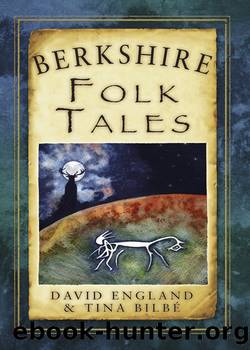Berkshire Folk Tales by David England

Author:David England
Language: eng
Format: epub
ISBN: 9780752492889
Publisher: The History Press
Published: 2013-06-05T00:00:00+00:00
The Fatherâs Tale
There were poor harvests in 1829 and 1830, causing a rise in the price of bread and in unemployment among rural labourers. Father and me were laid off during the bitter winter months from our work on Tom Tullâs farm.
On top of all the suffering my father described, we faced a new threat when farmers started bringing in horse-powered threshing machines. During the months after the harvest was gathered in, we had stayed in work to do the threshing. Now, when our one-week contract finished after harvest, we were laid off and had no wages coming in. We had Poor Law relief, but each person needed 3½ gallon loaves11 each week to keep body and soul together, and the Poor Law only gave us enough money for two loaves. We starved.
Then, one day, these big tough men arrived from Kent, with their angry and powerful words. They told us about their leader, Captain Swing, who was stirring up protests against the poor living conditions of agricultural workers â the âoppressed poorâ they called us. This Captain Swing wrote letters to the landed gentry â opulent landowners, farmers, magistrates and clergymen â demanding an end to starvation wages. When there was no response, Captain Swing called on the workers to riot, with the slogan âBread or Bloodâ.
Well, the condition of us agricultural workers in the villages around Hungerford was no better than in Kent. Since the enclosure of our common land, things had gone from bad to worse, as my father has described, and now the new threshing machines were reducing the need for our labour.
So, the words of the Kent men made a powerful impact on us, âBread or Bloodâ. Their words worked like fire in a hayrick, internal combustion slowly warming up until the whole rick burst into flame. Once it starts, there is no damping it down.
Captain Swing letters were written to all the landed gentry. We knew by this time that âCaptain Swingâ was just a made-up name, to protect the letter writers. The letters had an effect, though. The gentry was worked up, fearful about what had happened in Kent: rioters burning tithe barns, demanding money with menaces, wrecking threshing machines.
The gentry called a Vestry Meeting right away and agreed an increase to our agricultural wages, from 9s to 10s per week, and an increase to Poor Law relief, for a married man with more than two children, by the cost of an extra gallon loaf for each child above his second.
Meanwhile, a crowd of us had gathered outside Hungerford Town Hall to give support to our demands. John Willes, a county magistrate, met our spokesmen, which included me. He told us about the increases the Vestry Meeting had agreed, to which we gave our assent.
Mr Willes then complimented the conduct of the rural labourers, which, he said, was marked by restraint and civility in the way we expressed our sense of the suffering and hardship we had endured and our repudiation of any intention to provoke riot or disorder.
Download
This site does not store any files on its server. We only index and link to content provided by other sites. Please contact the content providers to delete copyright contents if any and email us, we'll remove relevant links or contents immediately.
| Africa | Americas |
| Arctic & Antarctica | Asia |
| Australia & Oceania | Europe |
| Middle East | Russia |
| United States | World |
| Ancient Civilizations | Military |
| Historical Study & Educational Resources |
Machine Learning at Scale with H2O by Gregory Keys | David Whiting(4289)
Never by Ken Follett(3929)
Fairy Tale by Stephen King(3365)
Oathbringer (The Stormlight Archive, Book 3) by Brandon Sanderson(3121)
The Man Who Died Twice by Richard Osman(3060)
Will by Will Smith(2899)
Rationality by Steven Pinker(2348)
Can't Hurt Me: Master Your Mind and Defy the Odds - Clean Edition by David Goggins(2317)
The Dark Hours by Michael Connelly(2299)
Friends, Lovers, and the Big Terrible Thing by Matthew Perry(2211)
The Dawn of Everything: A New History of Humanity by David Graeber & David Wengrow(2185)
Principles for Dealing With the Changing World Order: Why Nations Succeed and Fail by Ray Dalio(2028)
HBR's 10 Must Reads 2022 by Harvard Business Review(1832)
A Short History of War by Jeremy Black(1831)
Go Tell the Bees That I Am Gone by Diana Gabaldon(1746)
A Game of Thrones (The Illustrated Edition) by George R. R. Martin(1705)
515945210 by Unknown(1660)
Kingdom of Ash by Maas Sarah J(1658)
443319537 by Unknown(1541)
